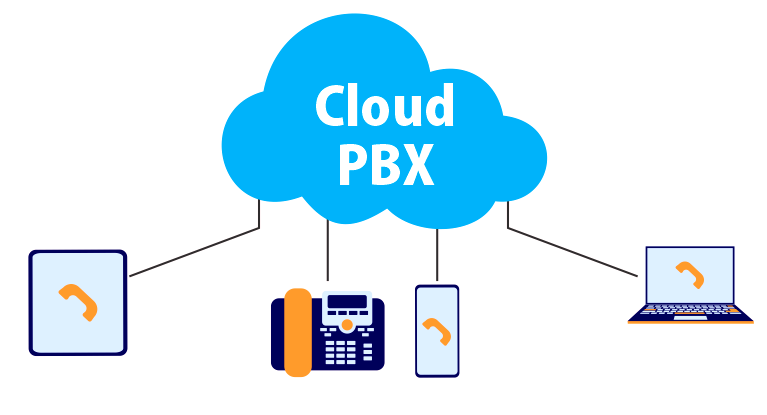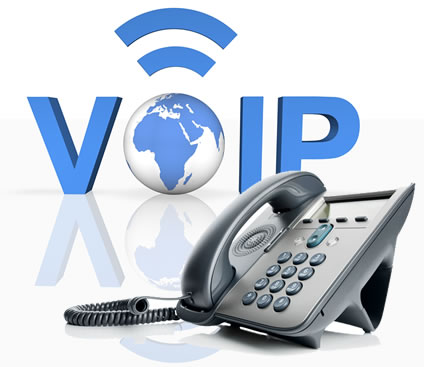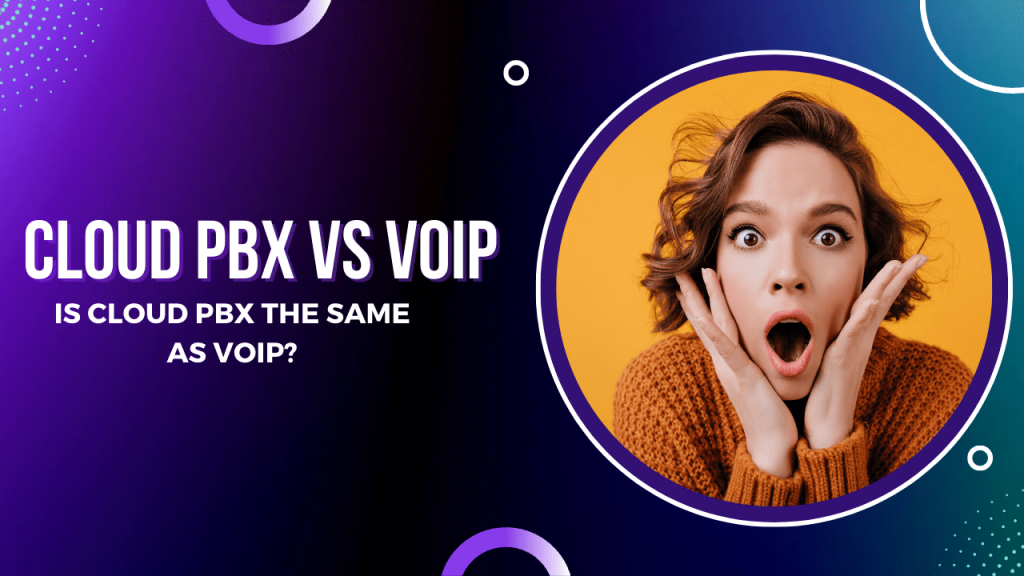In telecommunications, terms like “Cloud PBX” and “VoIP” are often used interchangeably, leading to confusion among many individuals. While Cloud PBX vs VoIP technologies are related, they are different.
This article will explore the intricacies of Cloud PBX vs VoIP, Cloud PBX and VoIP, exploring their definitions, functionalities, differences, and also the best choice for your business.
By the end, you will clearly understand how they relate to each other and how they can benefit your communication needs.
Cloud PBX vs VoIP – Is Cloud PBX the Same as VoIP?
So, lets identify that cloud PBX vs VoIP are the same terms or somethings different to each others.
What is Cloud PBX?
Cloud PBX, or Hosted PBX, refers to a virtual phone system that operates over the Internet. It eliminates the need for physical hardware and is managed by a third-party service provider.

Cloud PBX leverages the power of cloud computing to handle call routing, call forwarding, voicemail, and other telephony features.
It allows businesses to enjoy the functionalities of a traditional PBX system without the burden of on-site maintenance and infrastructure costs.
How Cloud PBX Works?
Cloud PBX leverages VoIP technology as its underlying communication protocol. Instead of using physical phone lines, it routes voice and data packets through the Internet.
You can see the image below for how hosted cloud PBX works?

When a call is made, the voice data is converted into IP packets and transmitted to the recipient’s device using the internet connection.
The call can be received on various devices, including desk phones, smartphones, or softphones installed on computers.
Read Also: Free Proxy List for WhatsApp
Benefits of Cloud PBX
- Cost Savings: Cloud PBX eliminates the need for expensive hardware and maintenance costs associated with traditional phone systems.
- Scalability: Businesses can easily add or remove phone lines and features as their needs change.
- Flexibility: Cloud PBX enables employees to make and receive calls from anywhere, providing remote working capabilities.
- Reliability: With redundant infrastructure and automatic failover mechanisms, Cloud PBX ensures high availability and continuity of communication.
- Advanced Features: Cloud PBX offers a range of advanced features such as call forwarding, voicemail-to-email, virtual receptionist, and call analytics.
What is VoIP?
VoIP, or Voice over Internet Protocol, is a technology that enables voice communication over the Internet. Unlike traditional telephone systems that rely on dedicated physical lines, VoIP converts analogue voice signals into digital packets and transmits them over IP networks.

It utilizes the internet infrastructure to facilitate voice calls, video calls, and multimedia sessions. VoIP offers flexibility, scalability, and cost-effectiveness compared to conventional telephony.
The Advantages of VoIP
- Cost-Effective Calling: VoIP offers significantly lower call rates than traditional telephone services, especially for international calls.
- Rich Media Communication: VoIP supports not only voice calls but also video calls, instant messaging, file sharing, and other multimedia services.
- Integration Capabilities: VoIP can integrate with various business applications, enabling streamlined communication and collaboration.
- Mobility: VoIP allows users to make and receive calls on any internet-connected device, providing flexibility and mobility.
- Scalability: VoIP scales with growing business needs, allowing seamless expansion without hardware limitations.
Key Differences Between Cloud PBX and VoIP
While Cloud PBX and VoIP are closely related, there are some key differences between the two:
- Scope: Cloud PBX refers to the virtual phone system infrastructure, including call management and routing, while VoIP is the underlying technology for transmitting voice over the Internet.
- Management: Cloud PBX is typically managed by a third-party service provider, while the organization can implement and manage VoIP.
- Infrastructure: Cloud PBX eliminates the need for on-premises hardware, as it is hosted in the cloud, while VoIP can be deployed on various devices using hardware or software solutions.
- Features: Cloud PBX offers a comprehensive set of features, including call forwarding, voicemail, and automated attendants, while VoIP primarily focuses on voice communication but can support additional multimedia services.
Choosing the Right Solution
When deciding between Cloud PBX and VoIP, assessing your organization’s specific needs and requirements is crucial. Consider factors such as budget, scalability, feature requirements, and support.
Cloud PBX is an ideal choice for businesses seeking a fully managed solution, whereas VoIP is more suitable for organizations that want greater control and customization over their communication infrastructure.
You can check here the best free cloud PBX providers.
Future of Cloud PBX and VoIP
As technology continues to evolve, the future of Cloud PBX and VoIP looks promising. With advancements in artificial intelligence, virtual assistants, and integration capabilities, these technologies will offer more robust communication experiences.
Expect enhanced features, increased security measures, and seamless integration with other business tools, further transforming how organizations communicate.
Conclusion
In conclusion, while Cloud PBX and VoIP are unrelated, they are different. Cloud PBX is a virtual phone system that operates over the Internet, while VoIP is the underlying technology for transmitting voice communication over IP networks.
Both technologies bring numerous benefits to businesses, including cost savings, scalability, and flexibility. Understanding the differences between Cloud PBX and VoIP will help you make informed decisions when implementing a communication solution that suits your organization’s needs.






